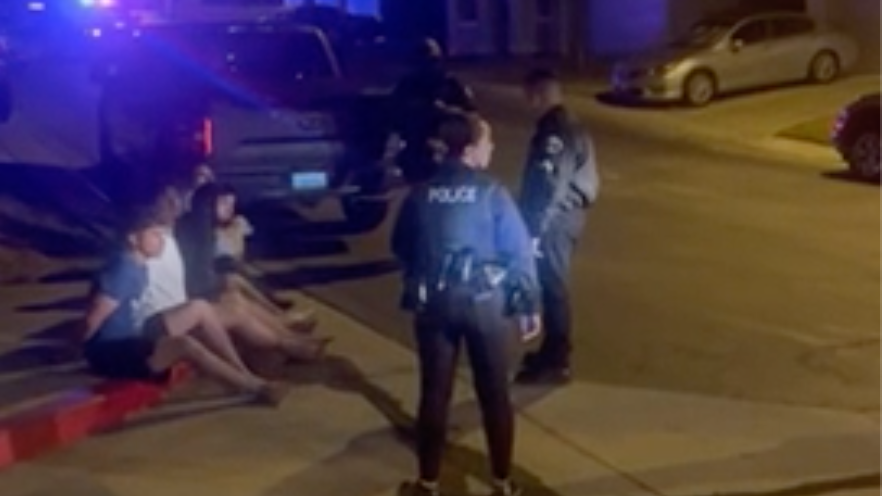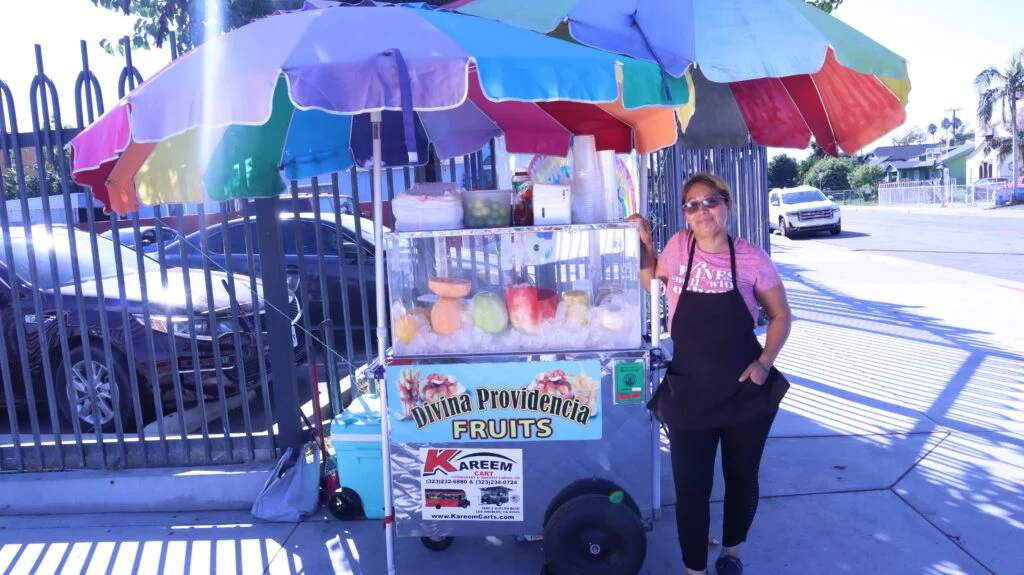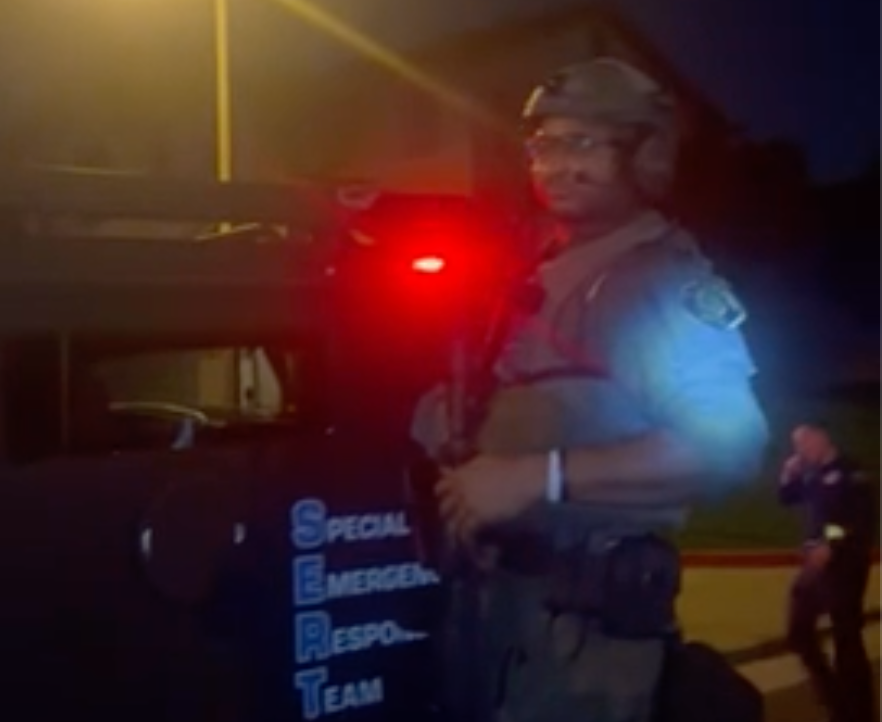L.A. Street Vendor Advocate Arrest Spotlights Concerns Over Free Speech, Police Retaliation
Police raided Ryan Cortez’s home after he participated in a protest against police harassment. On Oct. 6, a jury acquitted Cortez, but concerns over free speech remain.

This story was first reported by LA Public Press, an independent, non-profit newsroom advocating for a better Los Angeles. You can subscribe to their newsletter here.
Around 4:20 a.m. officers of the Huntington Park Police Department surrounded Ryan Cortez’s home in unincorporated-Whittier. Dressed in tactical gear and backed up by at least two armored vehicles and a slew of patrol cars, police banged on the door and shouted through a bull-horn for his entire family to come out.
Cortez and his entire family were removed from the house barefoot and cuffed while the house was searched the morning of Jul. 20. His older brother Lance, two younger brothers (18 and 16), along with his mother and father were put on the curb while police confiscated Ryan and Lance’s computers, a camera, and all of the family’s cell phones. Cortez was then arrested and taken to a Huntington Park holding cell.
On Thursday a Downey jury acquitted Cortez of the charges arising from a protest he helped lead against the mayor of Huntington Park, in response to the city’s treatment of street vendors. Cortez now plans to sue the city for putting him and his family through this ordeal.
“I shouldn’t have gone through all of this bullshit considering we were just advocating for the street vendors. I had to miss work for two weeks and they really retaliated against us,” Cortez said on the steps of the Downey, Los Angeles Superior Court building.
Cortez, 21, was active all summer in defending the rights of street vendors, who had found themselves harassed and fined by Huntington Park police. The raid happened after a protest in front of Huntington Park Mayor Marilyn Sanabria’s home. Cortez was booked on a charge of felony “Criminal Threat.”
At trial, a Los Angeles County District Attorney’s Office prosecutor argued that Cortez made comments that constituted a “clear and present danger and led other people to immediately erupt into violence,” defining the act of protest itself as violence—the jury disagreed. No one during the trial testified that there had been any physical violence on that night, no fights broke out, nor was anyone injured.
The possible retaliation against Cortez was not unique and the actions of Huntington Park police raise questions about small city governments in LA County using police to trample on First Amendment rights. In addition to Cortez, police arrested two street vendor advocates during a recent city council meeting. And another raid on street vendor advocate Robert Begay’s home sent chills through the community, as activists levied accusations of police retaliation against protesting.
LA Public Press made several requests for comment to various Huntington Park city officials, the police department, and individual councilmembers, but all declined to comment on this specific issue. Councilmember Eddie Martinez forwarded a set of questions asked by LA Public Press to the city attorney, assuring that responses would be forthcoming. After two days, Martinez responded saying that the council decided not to comment for this story.
Vendors harassed, and protests ensue
In late June and July, street vendors in and around Huntington Park began complaining about police harassment and confiscation of their equipment. Videos of the harassment filmed by street vendor advocates went viral on TikTok and showed several HPPD officers surrounding vendors, confiscating a fruit cart, asking vendors for their permits, and writing up citations. However, in at least one case, a vendor was found to have their permits entirely in order or was cited for laws outside of the jurisdiction they were operating in.

Activists, including Cortez and Edin Enamorado, responded by showing up to the Jul. 18 Huntington Park City Council meeting, where they loudly voiced their frustrations with police harassment of street vendors.
“Huntington Park wants to launch a war on street vendors … to treat them like they’re delinquents,” said Cortez during the public comment portion of that meeting.
During and after that meeting, three street vendor advocates were arrested, including Edin Enamorado. Frustration ensued and advocates decided to continue their protest after the city council meeting. That same night, about 20 people gathered outside Mayor Sanabria’s home, marching, carrying signs and chanting “when street vendors get attacked, what do we do, fight back.” Cortez said police dispersed protesters in about an hour.

The allegations against Cortez stem from the assertion that he said, “that bitch needs to die” directed at Sanabria. The prosecutor argued this led to a violent protest outside the mayor’s home, but the jury did not find any evidence of violence convincing, nor was any evidence of physical violence produced. The only evidence offered that Cortez even said those words was the testimony of two people, a police officer and a detective, employed by the Huntington Park Police Department.
The defense, in turn, brought up a witness who testified that he never heard Cortez say that phrase or direct protesters to the mayor’s house. Sanabria took the stand and recounted how she remembers cowering inside her home during the protest. She also recalled getting her phone and texting Huntington Park Police Chief Cosme Lozano about the protest happening outside.
Upon being arrested, Cortez was taken to a holding cell in Huntington Park, where he was booked on charges of felony “Criminal Threat” (PC422) while his family scrambled to figure out what had happened and how to get their son released—all without their cell phones, which had been confiscated.
However, after Cortez retained an attorney, the LA County District Attorney’s Office reduced the charges to a misdemeanor (PC 415) and offered Cortez a deal of 12 months in a diversion program, an order to stay at least five yards away from the mayor, the mayor’s home and city hall and 40 hours of community service. Cortez declined to take the deal and was tried on the misdemeanor charges. Had he been found guilty, Cortez might have faced up to 90 days, a fine of up to $400, or both.
Robert Begay, another advocate for street vendors, had his house raided on August 3rd. Police handcuffed his girlfriend, sister, and elderly mother around 5 a.m., according to Begay. Begay said he was taken to the police station, eventually bailed out, and no charges were ever filed.
“They came and raided my house for the same thing they got Ryan for,” Begay said. “And when they came, they didn’t give me the search warrant right away. I found out about it when I got to the police station. They were harassing me and giving me the run around.”
Advocates have alleged that the raids amount to political repression and retaliation for political speech critical of the city’s actions—pointing to the significant show of force and resources expended on the raid, in contrast to the relatively trivial charges levied.
Protests on trial
Over the course of a four-day trial, beginning October 2, the prosecutor claimed that Cortez had made inflammatory statements inciting violence, especially against Sanabria. In turn, the defense cast doubt on whether Cortez had even made the statements police claimed he had, further arguing that all his actions were protected free speech.
The jury deliberated for only two hours before returning to deliver a unanimous verdict of not guilty. For a trial over a misdemeanor, there were several dramatic moments, including questioning about profanity, racial slurs, and a highly emotional testimony in which the mayor of Huntington Park broke down in tears.
One man who has been active in the protests characterized the verdict as a “victory for free speech,” insisting that Cortez said nothing “threatening anyway.” But the man nonetheless asked to remain anonymous, citing a fear of police retaliation.
After the judgment, Cortez’s attorney, Christian Contreras, spoke outside the courthouse, saying that the decision sent a message: “Even if you try to silence activists or first amendment proponents, they’re not going to be silenced — they will fight back … They will take these cases to trial and they will win.”
The prosecutor for the district attorney Amber Swearingen-Ojuri hinged her case on the accusation that Cortez had made statements that, if actually uttered, would have constituted an immediate incitement to violence due to the fact that protesters were subsequently led to the mayor’s house the night of the contentious city council meeting. Cortez’s attorney, Christian Contreras, countered by attempting to demonstrate that he had not said anything so incendiary and instead had limited his statements to protected free speech.
Specifically, Swearingen-Ojuri accused Cortez of saying, “that bitch needs to die,” just outside city hall, and later “You fat bitch, you are going to die” once he was at the mayor’s home.
As evidence, the prosecutor called on three witnesses to take the stand, including HPPD Detective George Dominguez, HPPD officer Terrence Willie, and Mayor Sanabria.
While Willie, who was at the protest outside the mayor’s home, testified that he heard Cortez and other protesters say “Sanabria, fuck that bitch” and “all HP cops need to die,” when questioned by the defense, Willie acknowledged that no one became violent or was harmed at the protest.
Dominguez testified that he heard Cortez say, “that bitch needs to die,” outside of city hall. He also said that Cortez was wearing a face mask that day but that he recognized his voice. But when questioned in cross-examination as to whether Cortez’s alleged words led to a violent reaction, Dominguez said that no one reacted violently and that Cortez wasn’t near the mayor at the time.
In contrast, defense counsel cast doubt on whether Cortez had actually made any of the alleged statements, further arguing that even if such statements had been made, they would have been protected by the First Amendment. With a PowerPoint presentation during closing arguments, Contreras explained that all Cortez was doing during the council meeting and protest at the mayor’s home was advocating against the harassment of street vendors. Throughout the trial, Contreras also pointed to Edin Enamorado as the actual leader of the protesters that day.
Another street vendor advocate and witness for the defense, Moises Camacho, testified that he had not heard Cortez say the alleged vitriolic words nor anything about killing the mayor. Camacho added that it was Enamorado’s idea to go to the mayor’s home.
Questioned as to how he could’ve heard anything at all over the yelling at the protest, Camacho responded that there weren’t all that many protesters and that he would’ve still heard what Cortez said.
Detective Dominguez and Officer Willie also testified in general about the events of that night. Dominguez said there was a briefing with “a team of officers stationed at city hall” before the council meeting about specific people who they expected to be disruptive. He added that he heard activists yelling “fuck you, Dominguez” at him. Officer Willie said that protesters shouted epithets at him, including “mayate” (a Mexican word akin to the N-word in English) and “chango” (a Mexican word meaning monkey). He also said he started to write up citations to get people to disperse.
While testifying for the prosecution, Mayor Sanabria said she had received death threats via social media and felt endangered by the protesters yelling outside her home. She teared up as she testified that she’d begun shaking uncontrollably inside her apartment while the protestors marched outside — and that she continues to suffer anxiety from the protest that day.
While Sanabria spoke, the prosecutor Swearingen-Ojuri showed her and the jury Instagram messages, comments, and emails which said things like “Fuck is wrong with you, puta!” and “your life is coming to an end.” The messages shown were sent from the Instagram accounts johnnyb_2.0 and johnny_b.goode. None of the messages were proven to be connected to Cortez.
A video of the from the Citizen app, which sends location-based safety alerts, was also played by the prosecution. It showed people walking outside the mayor’s home and Huntington Park Police cars, but did not show anyone acting violently, and Cortez was not visible in the video.
In cross-examination, Contreras questioned whether the mayor had heard Cortez specifically say, “that bitch needs to die,” and she said she didn’t recall, adding that she hadn’t seen Cortez outside her home, as she was inside her apartment hiding. When asked about whether it was true that people were upset the day of the council meeting because of what was happening to street vendors in Huntington Park, she responded simply, “okay.”
LAPP reached out to the Huntington Park city clerk and chief of police Cosme Lozano early in the legal proceedings, but no one returned our request for comment.
During closing arguments, the prosecution reiterated that the jury should find Cortez guilty on the basis of the two police witnesses testifying they heard him say the key phrase that provoked protesters and led them to the mayor’s home — which she framed as itself constituting a violent act, thus characterizing the protest itself as a form of violence. She also said that the statements police testified they had heard from Cortez at the mayor’s home were “clear and present danger and led other people to immediately erupt into violence,” again painting the act of protest itself as violence. However, there was no actual physical violence on that night, no fights broke out, nor was anyone injured.
In his closing remarks, Contreras showed a picture of an unfinished painting to the jury and said that just like every painting shows a story, this trial also showed a story about whether the city was going to be allowed to get away with silencing critics like Cortez who were advocating for the rights of street vendors.
